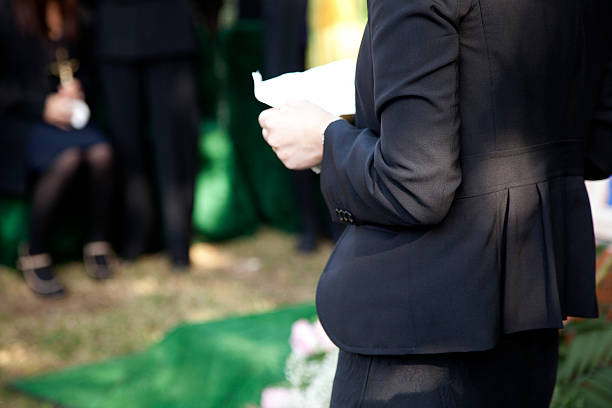You’ve been tasked with eulogizing your loved one – your brother, your father, your mother, your aunt – and you have minimal time to prepare. In my work as a funeral celebrant, I’ve personally eulogized hundreds of dear people and have listened to many more eulogies.
Here are my tips:
- Keep the eulogy laser-focused on the Person, your brother, father, aunt. I suppose this is obvious, but I have heard eulogists – particularly Christian eulogists – stray far from The Person in an attempt to get an inspirational message across. Concentrate on the specificity of your loved one’s signature life. What traits, what actions, what lifestyle, made your one absolutely one-of-a-kind? You are story-telling your unique loved one.
- Start from the beginning, summarizing where your loved one was born and the family into which your loved one was born. Ground the story in time and place. With specifics. Perhaps give some context: “He was born the year after WWII ended…”
- Use stories. Pick stories – maybe two or three (short ones) – that illustrate who your loved one was as a person – and for what he or she stood. If your loved one was all about family and his or her children – choose a story that illustrates this. If he or she was all about, say, building or fixing things, choose a story that illustrates that.
- Utilize the magic of “The Rule of Thirds.” No doubt your loved one was a person of abundant gifts – acknowledge he or she had many – but choose to concentrate on just three gifts. What were your loved one’s three gifts to the world? Or to you specifically? Don’t go through an extensive list. Choose just three. The Triptych. And back up each with a story. She was compassionate. HOW was she compassionate? He was a family man. What story best illustrates his love of family? She was an avid outdoors person, yes; but more importantly how did she impart that love of nature to you – and to others? “He was a “man’s man” who liked to bake cookies?” Great, what KIND of cookies did he bake?
- A eulogy doesn’t shy away from praising our Person. Through specific colorful stories seek to “show” your loved one’s personhood and soul. In telling the story of your Loved Person, you are welcoming others to “recognize” and see, indeed, that your loved one was as you describe him or her. Laughs, giggles and tears will be the response to your call.
What was he most passionate about in life? A eulogy seeks to shine a light on that. What was the significance of your uncle’s life? A eulogy seeks to name our Person’s significance; what he or she was about. “If you had to sum up who my brother was to the world, to others, he was tender. His tenderness showed through in the way he raised his puppies in his dog-breeding business…” - Be authentic. Don’t shy from the challenges or struggles that your loved one had. Yes, “tell the truth but tell it slant” (Emily Dickinson). True recognition of our Person in a eulogy always involves plain truth. Be plain-spoken about the difficulties. But tell it all with love!
- Go ahead and be emotional. It is perfectly okay for lots of emotion to come through. Emotion is absolutely what is expected. Don’t worry about expressing everything that you feel; with tears, with pauses, with tissues. Have your eulogy printed out just in case someone absolutely has to step in. But stay standing, if you surrender the written eulogy for someone else to read. Let it be yours. Claim it!
- Remember, others will “fill in” detail after the eulogy, during “Open Sharing.” In most cases, about a half a dozen stories will be shared in open mic that will “round out” your loved one’s eulogy. In addition, at receptions and wakes and at the bar for years to come, more stories of your loved one will be shared.
- Duration. Fifteen minutes is long enough. Twenty minutes might be too long. Ten minutes is probably adequate. Edit your eulogy down to the “best of.” Keep your eulogy as tight as you possibly can. Remember to make room for others’ open sharing.
- Concluding. I always wind down my eulogies with some statement in place and time as to when our Person’s life ended. And maybe a statement, if true, that he or she passed surrounded by family or holding his or her brother’s hand, listening to his favorite Van Morrison song. Was there some peace when he or she shoved off?
You can list by whom he or she is preceded in death. But definitely list who he leaves behind – Survived By – naming the significant members of his or her tribe. You can make this more lyrical than just a list by using wording such as; “Uncle Joe will be held tight in the hearts of all his three siblings: Suzy (with Jim), Greg (with Julie), and Fred (with Karin). His light and love will remain in his three children: Eunie, Billie and Robbie (with Kylie). And his legacy will live on in his grandchildren; Hallie, Kristie and Robbie Jr.”
And then my closing line is some version of the following: “We will hold Uncle Joe forever in our hearts. Of course we will… He’s a man, a huge presence in my life, who will be so very missed.” You are Re-membering your loved one to your tribe through story-telling….like only a sibling or daughter or nephew or cousin can! Being called upon to speak of and bear witness to our Person and his or her life is a great honor. So why not speak with intense joy, with great love, and brimming tenderness? What a great privilege to convey the tight bond of love.


